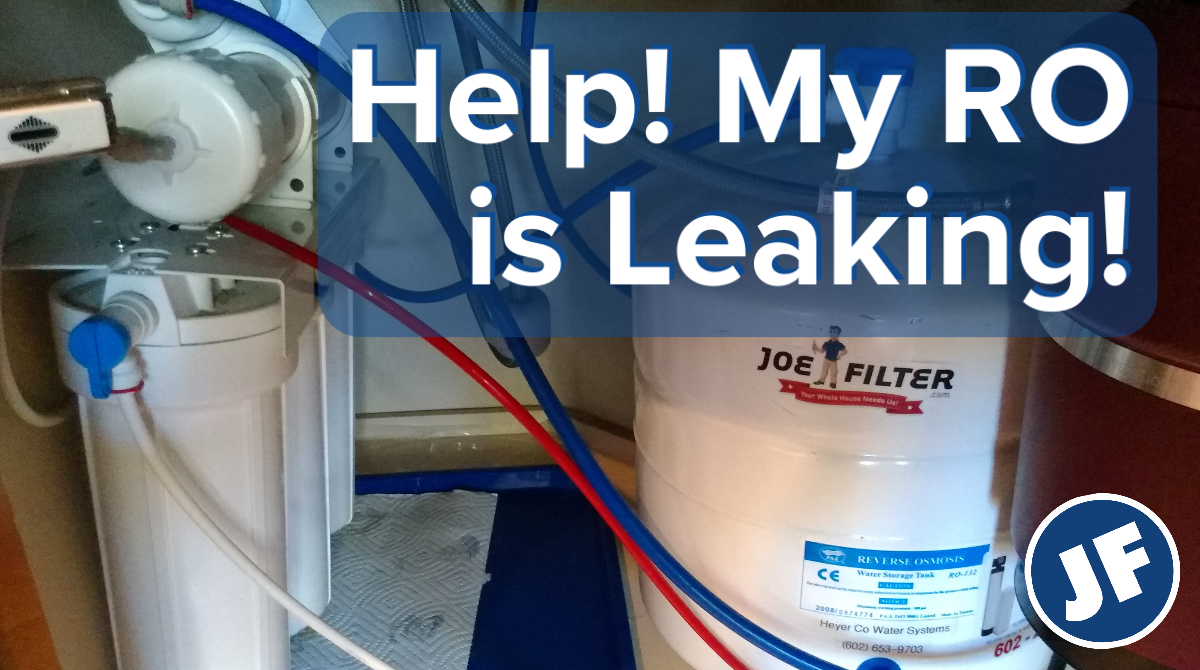My Reverse Osmosis is Leaking
If you have a reverse osmosis (RO) system, chances are you may have found it leaking before. RO systems are great, providing clean and healthy water for cooking and drinking, but they are very finicky and can easily spring a leak. This should be no surprise since it is essentially a bunch of exposed water lines, often located under the sink in a cabinet the majority of us use frequently. Below we will go over some of the more common causes for leaks and how you can help to prevent them.
If you are experiencing a leak right now, make sure you shut off the water to the RO system right away and call a local pro to come out to fix the problem.
Age of your System
As with all appliances, age does matter. The typical lifespan of a well kept RO system is 10 years. RO units are highly pressurized systems, and after 10 year of wear and tear, this pressure may cause the system to spring leaks. Besides just the pressure, older ROs are much more likely to leak from the all other causes too, compared to a newer system. The best way to prevent this is to have your system serviced regularly (most manufactures recommend every 6 months), and to keep track of its age. Once it gets to be around 10 years, if problems begin to occur more often, it is probably best to begin looking at new systems.
Water Pressure Spike
As mentioned before, RO systems are highly pressurized. So if there is a pressure spike in your city water, which is known to happen, your RO can become overly pressurized. This can result in serious damage to your RO, such as lines popping, connections/fittings breaking, and more. Not only can pressure spikes damage your RO system, but they also can damage other appliances like water heaters, water softeners and even your homes plumbing. To help prevent spikes like these, it is good to invest in a pressure regulator for your home if it does not already have one.
Filter Housing is Over Tightened
This is a common mistake people make. You’d think the tighter the housing, the less chance it will leak, right? Wrong!! Over tightening the housings will flatten the o-ring inside allowing the water to get past it. This is what has happened if you see little dribbles of water coming from the top of the filter housing. Over tightening can also cause the housing to crack (keep in mind, it is just plastic). To prevent this, when changing filters screw the filter housing back on by hand. Once it is tight and use the filter (or housing) wrench to tighten it only an additional quarter turn.
Accidental Bumping
This is by far the most common cause of a leak. Most RO systems are located in active cabinets underneath the sink. So anytime someone is using that cabinet and they accidentally bump the system or tug a line, it can cause a leak. As we said before these systems are very finicky, highly pressurized, and have a lot of exposed water lines in that cabinet. Even something being stored in that cabinet falling over on the RO could cause it to leak. To help reduce this risk, it is best to keep things stored in that cabinet a decent distance away from the RO system.
These are just 4 of the most common causes out there, there are definitely more. This all being said, and RO system is not going to be constantly leaking, especially if you take the proper precautions against them. Though in your tenure of having an RO, there is a good chance you may experience a couple small ones. If you do, simply shut off the water to the RO to prevent further leaking and call a local pro to come out to fix the problem. If you are located in the greater phoenix area of Arizona, we are always happy to come out!
Ask your local pro about installing a Leak Block Sensor on your RO. These devices will let you know if there is a leak by beeping and automatically shut off the water to your RO to prevent any further leaking. These can save you from coming home to a disaster if a leak occurs while you are not at home.
Can you think of any other causes we didn’t list, or do you have any crazy stories about one? Let us know in the comments!

